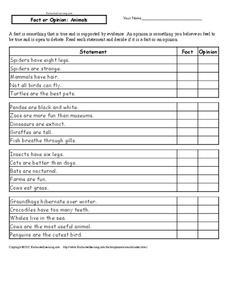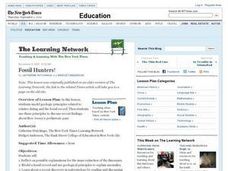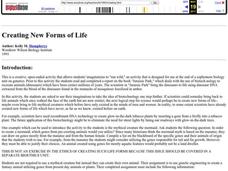Curated OER
Relative Dating - Telling Time Using Fossils
Students use fossil range charts to explain relative dating. They graph for ammonites, marine organisms that went extinct at the same time as dinosaurs.
Curated OER
Investigation 3 - Examining Your Fossil
Fourth graders examine the fossils they made previously. They examine the details of the fossil with a hand lens and come up with conclusions about the fossils. They record what they see and draw conclusions about the environment of the...
Curated OER
Morphing
Pupils examine how organisms adapt to their environment in order to survive. As a class, they discuss the extinction of the dinosaurs and review Darwin's theory of survival of the fittest. They select an animal to morph in the future and...
Curated OER
Dig This
Fifth graders explore the work of paleontologists and the life of dinosaurs and create a sculpture of the bones of a Stegosaurus. The sculpture was then buried and used by other classes for a dig.
Curated OER
Diversity and Adaptations of Organisms
Eighth graders discover the difference between extinct and endangered animals and discuss the reasons why this has occured. They identify threatened and endangered animals living in their local area as well.
Curated OER
Make a Cast of a Tyrannosaurus rex Fossil
Second graders examine the formation of fossils and list the different types. They make cast model of a dinosaur fossil. They write about conditions that are necessary for fossils to form and create a model of a buried fossil.
Curated OER
Studying Fossils
Students hypothesize dinosaur size and speed by looking at dinosaur track way or by measuring a dinosaur models water displacement. In addition, techniques to help students become familiar with the ways paleontologists study fossils can...
Curated OER
Studying Fossils
Students study the Evolution in the Light of Fossils. Activities in this lesson range from quantitative measurements of hominoid skulls to the comparison of hominoid bone structures. They hypothesize dinosaur size and speed by looking at...
Curated OER
Why Care About Amphibian Population Decline and Malformations?
Students examine the reasons for preserving wildlife. They look at reasons for amphibian malformations and write an essay about the ethical issues that this brings up. They listen to the teacher read quotes about extinction and how the...
Curated OER
Eagles and Other Raptors
Students become familiar with basic facts and behavior of the American Bald Eagle using a combination of classroom presentation, Video, Internet searching, "hands on" computer activity, and touching of feathers and displays.
Curated OER
Fact or Opinion: Animals
How many legs do spiders have? Is that an opinion, or is it a fact? Complete a worksheet with four sets of five questions about different animals and their attributes, noting whether each statement is a fact or an opinion.
Curated OER
Relative Dating-Telling Time Using Fossils
Students explore how to read fossil range charts. They develop an knowledge of the strengths and weaknesses of the fossil record. Students become familiar with the concepts index fossil and fossil range. Students use bar graphs to...
Curated OER
Toilet Paper Geologic Time Scale
Learners examine and demonstrate the extent of geologic time compared to recent time. They develop a demonstration of geologic time using an unrolled roll of toilet paper, with each sheet of toilet paper representing 20 million years.
Curated OER
Academic Raceway: Animals
Race to the finish line with this interactive PowerPoint! Students must answer multiple choice questions about animals to get to the Winners' Circle. Tip: Have students play individually until they can get all of the questions correct.
Curated OER
The Rock and Fossil Record
Go deep in your paleontology unit with this spectacular set of slides! It introduces viewers to the types of fossils, a few famous fossils, and the geologic eras. This is done with easy-to-read text, diagrams, photos, and even videos.
American Museum of Natural History
Layer of Time
Dig through the layers for a better understanding of fossils. Scholars learn that fossils form in layers of sedimentary rock. Pupils arrange virtual layers to show the fossil record of different species. Once the layers are correct, they...
Curated OER
Fossil Kit II
Youngsters examine four fossil replicas and chart their time periods, vertebrate or invertebrate, and the names of other organisms living at the same time. A specific fossil kit is available for sale if you do not have the same samples....
Curated OER
Saving Sturgeon
Marine biology apprentices interpret data of sturgeon interaction with gill nets. They use the data to calculate the percentage of fish entangled in each twine size to discover if there is any correlation. This is a valuable exercise in...
Curated OER
Living Fossils
Students study the term living fossil and examine why some of the reasons they survived. For this fossils lesson students form a hypothesis and use data to see if it is accurate.
Curated OER
Fossil Hunters!
Students explore the various ways in which geologists create fossil records. Working in pairs, students create a model of a fossil record through a hands on activity. They relate their experience to recent discoveries in geology and...
Curated OER
Name Match
In this name match worksheet, students match up ten species to their description or history by drawing a line between one to the other.
Curated OER
Tsunami
Students examine what causes tsunamis and why they all behave differently. For this tsunami lesson students complete a group activity after viewing a video.
Curated OER
Idioms
It's often confusing which word should be used to complete a sentence. Although this activity's title insinuates that idioms will be discussed, the practice section is just about using words like to, who, with, as, and that correctly....
Curated OER
Creating New Forms of Life
Although not particularly educational, here is a creative group activity in which high school biologists will use their imaginations to create a new life form combining characteristics from existing life forms. Each group must come up...

























